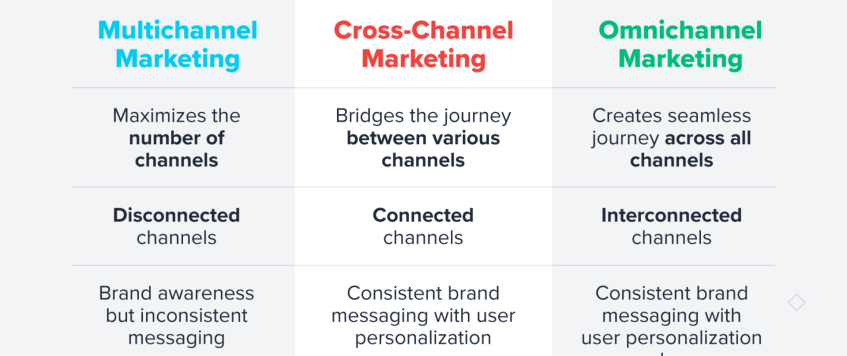-
14
Dec
What Is Cross-Channel Marketing?
Cross-channel marketing allows brands to interact with consumers across several channels such as web, email, mobile app, SMS, call center, direct mail, and in person.
This approach enables your brand to send relevant marketing content through each channel of your customers’ shopping experience. Cross-channel marketing tactics can be employed across various stages of the customer journey, from customer acquisition to retention.
Savvy marketers will want to take advantage of cross-channel marketing to add more touchpoints to the user’s buying journey. Keep reading to fully understand how to create a cross-channel Marketing Strategy and how it differs from multichannel and Omnichannel Marketing.
Cross-Channel Marketing Benefits
1. Improves Return on Investment (ROI)
One of the biggest advantages of cross-channel marketing is that it helps businesses achieve a better ROI. By analyzing customer data, cross-channel marketers can determine which channels aren’t producing conversions.
After identifying weak points, your brand can improve its channels to keep customers coming back. This increase in retention across multiple, connected channels can lead to higher ROI. Marketers using at least three channels for their campaigns have a 90% higher customer retention rate than those with fewer channels.
2. Personalizes the Shopping Journey
A cross-channel approach allows marketers to identify their users’ ideal channels and offers for various stages in their shopping journey. After examining a customer’s ideal channel preferences, marketers can serve a shopping experience in the format the customer desires. For example, if users prefer SMS, you can lean into rich media messaging opportunities.
In addition to delivering content on the user’s desired channel, cross-channel marketing also uses customer data to create personalized messages. This feature is highly beneficial, since 80% of customers are more likely to buy from brands that send personalized messages.*
3. Delivers a Seamless Experience
Cross-channel marketing uses several communications channels to deliver a single campaign, requiring a seamless integration of multiple platforms for success. For example, a receipt from an in-store purchase is added to a customer’s mobile app. Soon, the mobile app will show them relevant offers based on their purchase history.*
From mobile apps and emails to live e-store chats and in-person interactions, today’s consumers are pushing for seamless shopping journeys across the expanding range of channels they use. In fact, 87% of customers believe brands need to invest in a seamless omnichannel experience.*
Cross-channel marketing is one way your brand can execute the seamless, multichannel campaigns consumers desire.
4. Forms 360° View of Customers
To show customers the content they prefer in a cross-channel Marketing Strategy, companies must become familiar with their demographics, habits, and intents. This knowledge gives brands a well-rounded understanding of their market.
By micro-segmenting customers into small categories, marketers can examine both the general demographics of their users as well as more specific data. This information includes the last time a user launched an app, the frequency of their app visits, their purchase history, and their intent.
Together, this individualized data allows your brand to grasp on to — and exceed — your customers’ expectations.
5. Builds a Strong Brand Identity
Since cross-channel marketing communicates a brand’s messages across multiple channels, it builds a recognizable brand identity and the desired public perception of your company. This identity is shaped by tangible elements like your company name, logo, fonts, messaging, and colors, as well as intangible elements like relationships and experiences.
Businesses are able to analyze consumer data and find a uniform brand identity that attracts their target market. When your brand identity is clear across every channel, consumers develop familiarity with your company’s voice and products. In turn, this positive brand identity can lead to customer loyalty.
6. Incorporates Smart Technologies
Cross-channel marketing also incorporates the latest smart technology. According to a 2021 survey, 86% of participants reported that AI will become a mainstream technology at their company.*
More businesses are investing in smart technology because AI enhances the customer experience. AI helps predict customer preferences, completely customized content, and links all communications channels seamlessly.
By using AI in cross-channel marketing, your brand can stay on the cutting edge of modern technology and offer customers a personalized shopping experience.
